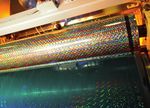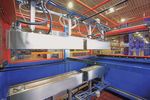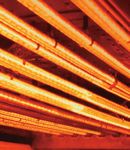Infrared Heat for Plastics Processing
←
→
Page content transcription
If your browser does not render page correctly, please read the page content below
Commodities or objets d'art, high-tech
Heating for Plastics
equipment or toys, packaging materials or
construction materials – we come across
plastics today in all shapes and forms used
in seemingly countless applications. In
space exploration and in the house, in
clothing and for food packaging, in medi-
Infrared heat meets all requirements
n
Heat transfer is simple – it requires no
cine and for protecting the environment –
contact with the material and no intermediate
medium such as air or water.
plastics are not only used as a substitute n Infrared transmits high power – foils, plates and
even irregular shapes are heated in seconds.
for other materials but often provide the n
The heating process fits in easily with the
manufacturing process – by appropriate
choice of emitter or emitter cassette,
solutions to previously unsolvable prob- the heating can be matched to the speed
of the process.
lems. Heat plays a central role in forming n Infrared heat can be targeted exactly
where it is required. Large surfaces can be
heated in exactly the same way as small
and processing plastics, especially thermo-
parts, curved surfaces or solid plastic materials.
n Infrared radiation is safe and can be easily
plastics. Heat is used for softening and switched on and off.
n The process is economical – the correct emitter
forming operations such as bending, selection allows high efficient heating. Moreover,
the heat loss is small, since the radiation
is directed at the process material.
stretching, blowing, deep drawing and
stamping or for packaging materials with
sterilised wrapping, shrink wrapping, heat
sealing, laminating. Heating can also be
used to temper, harden, glue and dry
plastics. Heating processes are even used
to separate plastic waste. The use of
infrared radiation opens up many options
for the direct transfer of heat into the
manufacturing process. Ink drying Tube bending and forming
2 3Only the infrared radiation which matches the processed
Radiation power (relative units)
material is absorbed
Visible light
UV short wave medium wave long wave
Just like visible light, a part of the broad infrared radiation
250
spectrum is reflected from the surface of the material while
Halogen/NIR
the rest is either absorbed within the material or passes
2600 °C
through the material. Every material consists of molecules 200
short wave
and molecular structures that absorb specific radiation
2200 °C
wavelengths. The radiation wavelength that is absorbed by
150 fast response medium wave
a material coincides with the wavelength of the molecular
1600 °C
oscillation in that material. The absorbed radiation releases carbon
energy to the molecule generating heat in the material. 1200 °C
100
For instance, plastics generally absorb infrared radiation in medium wave
the wavelength range above 2 μm. C-H-bonds are especially 900 °C
efficient because they absorb wavelengths between 3.2 μm 50
and 3.5 μm.
Wavelength fitting to the material
0 1 2 3 wavelength (µm)
Thin materials such as foils are difficult to heat with short
wave infrared because only a small component of the short The infrared spectrum of different Heraeus emitters.
wave radiation matches the absorption spectrum of the The curves show the radiation intensity in the different wavelength
material. Thin materials are transparent to the infrared ranges at the same electrical power ratings. While the halogen
radiation and short wave IR is not efficient. Medium wave emitter in the short wavelength region provides the highest power
radiation, on the other hand, is absorbed more readily and output, carbon emitters and medium wave emitters have significantly
the result is that the foil heats significantly faster at the same higher outputs at wavelengths above 2 μm.
electrical power input.
To avoid the loss of radiation Heraeus offers a wavelength
converter, consisting of a plate with mineral fibers. This
absorbs the radiation which has passed through the material
and radiates it back into the material at a different wave- medium wave
short wave 900 °C
length. The wavelength converter absorbs transmitted infra- 2200 °C
Polyethylen
0,1 mm
red radiation, heats up to 500 – 600 °C and then radiates
back medium- and long wave radiation.
PVC
Infrared Radiation – natural heat
0,02 mm
For solid materials, because of low absorption rates, short
wave infrared penetrates deep into the material and provides
wavelength (µm)
uniform volumetric heating. Medium wave radiation is
absorbed in the material’s outer layer and generally heats The absorption spectra for polyethylene and polyvinylchloride (PVC)
only the surface. With the correct infrared emitters, heating show strong absorption for infrared radiation between 2.5 and 4 μm.
The heating power of the sun is the perfect natural example. Infrared has many spectra plastics can be controlled according to very specific require- For these materials medium wave emitters have a greater efficiency
Infrared emitters from Heraeus Noblelight transfer heat ments. Pigments in coloured plastics increase the infrared than short wave and halogen emitters.
Infrared radiation is the heat which we feel in sunlight. without contact, which can be exactly adjusted to the absorption.
characteristics of the material. Infrared heat matches the
Like light, infrared radiation is electromagnetic radiation and absorption spectrum of plastics perfectly, which eases The power density determines the amount of
plastic processing. Another advantage of infrared emitters heat transferred Absorption (%)
is transmitted just as quickly and at virtually unlimited power. is that they can targetedly heat the material only where In turn, the amount of heat transferred to the material medium wave
100 short wave
needed and only as long is required for a particular process. depends on the emitter’s power, its temperature and 900 °C
2200 °C
Infrared radiation is transformed into heat in the material This results in reproducible complicated heat processes and distance from the material. Once the product material has
enables an automation of the process. determined the spectrum, the spectrum fixes the tempera- water
50
itself. With infrared technology we use the infrared radiation ture and thus the electrical power of the emitter. Therefore,
to increase the amount of heat transferred, the power
energy in a controlled manner. density (radiation output per unit surface area) has to be
0 1 2 3 wavelength (µm)
increased. This is achieved by physically arranging the
emitters, by using twin tube emitters and by additional This overlay of the absorption spectrum of water demonstrates that
reflectors. medium wave emitters also have a significantly higher efficiency
than short wave emitters for drying applications.
4 5Twin tube emitters achieve a particularly high radiation strength.
Fast Response Medium Wave
Halogen/Short Wave/NIR
Carbon Round Tube
According to their material properties, plastics absorb some of the
Medium Wave
Carbon Twin
Short Wave
infrared radiation, reflect some at the surface and allow some of the
radiation to pass through. By carefully selecting emitters to match their
spectra to the material being processed, the majority of the radiation is
absorbed and converted to heat creating an efficient operation.
Infrared Emitters –
Non-dazzle IR emitters – for safety reasons with some Fast response, medium wave emitters are twin tube emit-
Selection criteria for infrared emitters applications it makes sense to filter out intense light ters with a spectrum between short wave and standard
for every application
radiation. This is achieved by applying an antiglare coating. medium wave emitters. These emitters can be supplied in
Infrared spectra define the heat distribution in plastics. lengths up to 6.4 m so they are ideally suited to be used
By matching the infrared spectrum to a specific application, Emitter shapes – As a producer of quartz material,Heraeus in large modules. They achieve a significantly higher area
the process flow rate, heating time and energy used are also offers twin and round tube emitters in curved forms. heating power than standard medium wave emitters.
Every Heraeus emitter can be adjusted to the appropriate optimised. Consequently, the heating method can be matched exactly
to different manufacturing processes. Carbon infrared emitters CIR® are a recent development.
shape, length and spectrum for the required process. The emitter’s rates of heating and cooling are important These emitters use a carbon ribbon as the heating ele-
for control, cycling process stages and process safety. Short Infrared emitters and their characteristics ment. They have very fast heating times (1 – 2 sec) which
This makes even complicated heat processing wave emitters, fast response medium wave emitters and car- means they are especially suitable for processes where the
bon emitters have the quickest response times and therefore NIR InfraLight halogen emitters are cost-effective emit- heat must be switched on and off quickly. The spectrum is
reproducible and enables an automation of the process. the most favorable control characteristics. ters produced to standard commercial dimensions used in the same as medium wave emitters so carbon emitters are
many infrared systems. Heraeus gold reflectors increase the efficient for heating plastics and for drying processes.
Length and physical strength – Halogen emitters are efficiency of the halogen infrared emitters. This short wave, They are produced in lengths up to 3 m.
manufactured with a heated length of up to 1 m and carbon high light component emitter is used to heat thick sheets
emitters with a heated length of up to 3 m. Because of their and solid plastic materials. Medium wave emitters distinguish themselves by being
high physical strength, twin tube infrared emitters can be highly efficient and stable while having a long operating
supplied in any length required up to 6 m. Short wave, twin tube emitters are comparable in s pectrum life. The medium wave emitter spectrum is well suited for
to halogen emitters. They are used in processes where rapid heating processes with most materials and the emitters are
Reflector – On request Heraeus Noblelight offers emitters heating is important. Because of their stable construction, available in lengths up to 6 m.
with gold reflectors. With a gold coating approximately 95 % twin tube emitters can be supplied in larger lengths. They
of the IR-radiation can be absorbed, which doubles the ef- offer virtually double the life compared to h
alogen emitters
fective intensity. because of their stronger heating elements.
6 7Infrared Modules –
process heating to order
Cutting PTFE foil Tunnel oven
Infrared modules are complete emitter arrays that
comprise small and large emitter cassettes, mobile drying
systems or IR dryers combined with an intensive air flow.
Modules – manufactured for the process Applications
The Heraeus KR-module is the infrared building block for Welding plastic containers, forming interior parts,
every application. The modules are tuned and equipped thermoforming or deburing. No matter if continuous material
IR modules with curved emitters for laminating and embossing 3D welding
to suit your particular process and come in a variety of or several parts, every infrared module can look different.
sizes to accommodate a range of customer systems. The The one thing, all emitters have in common is the possibility to
module systems have custom built infrared emitters and match the infrared system perfectly to the required material
are designed to supply exactly the required power for your and process. The type, thickness or color of plastic parts can
process. The module design also takes into account issues have a large influence on the heating process. Wavelength,
specific to infrared technology such as emitter design, power and even the shape of the emitter can play a role in
mounting, thermal and mechanical stability, visual and con- the process. It is worth, taking a closer look at the process
tact protection and ventilation. These modules are ready for parameters before installing a new plant. Perfectly fitted
immediate connection, either for retrofitting or for installing infrared emitters can save energy and time.
in new projects. Please contact us!
Infrared systems – complete thermal processes
If needed, Heraeus can supply complete infrared systems
with automatic emitter output and product temperature
control. Our systems are a combination of infrared m
odules
and come complete with a switchboard cabinet. Every Coating of synthetic fabric Welding of transport boxes Crease removal of synthetic fabric
module and system combines comprehensive infrared
technology and Heraeus application know-how.
All possibilities
In designing a heating module, the most important
consideration is developing a productive solution for the
specific heating requirement. Because of our modular
concept, Heraeus can provide heating for practically any
size application. Our flexibility with emitter length, design,
and control means that virtually every industry process
requiring thermal technology can be accommodated.
Situations having production lines with varying widths,
specific temperature profiles, high power density require-
ments are easily handled including control specifications.
Embossing foils Relaxation of plastic pipes
8 9Targeted Heating –
the innovative Infrared Technology
Plastic heating with Small surface emitter
an Omega emitter
There is a real challenge in those processes where only
very small or curved surfaces, corners, edges or specific
contours of a product need to be heated.
Contour emitters are individually formed to replicate
corners or edges of work pieces and so allow targeted
Tests in the Application Center
bending processes or localised activation of adhesives.
Small surface emitters heat complex geometries.
Plastic welding Preshrinking of PET film
Tested, Checked and Proven
Omega emitters and Rivet heaters are perfect for hot
staking, hot riveting or tube forming.
The new QRC® infrared emitters (QRC = quartz reflective
coating) have a nano reflector made of quartz material, so
they can contoured exactly to components. This is espe-
cially advantageous for processes like deburing, welding or
adhesive activation. Know-how with tradition Areas of application
Heraeus Noblelight has many years’ experience in infrared n Heating
All of these emitters are matched to the particular process in heating technology and provides individual advice and n Drying
terms of shape, size and spectrum. Heat is totally targeted service. Heraeus Noblelight offers its customers the n Coating
where it is required. Consequently, energy losses are as capability for proving trials in its in-house Application n Laminating
small as possible. Center or on-site with experienced technical assistance. n Annealing
Welding of glass-filled QRC ® infrared emitter with nano reflector Heraeus Noblelight has Application Centers all over the
polypropylene cylinders Heraeus provides solutions which fit into your process and world. Heraeus Noblelight is your partner
are completely tuned to your requirements. for industrial heating processes in
Research into the impact of infrared emitters, the influ- n Glass
The development of the emitters revolves around the ence of different spectra, measurement of the temperature n Plastics
requirements of the customer and makes use of the latest distribution, determination of the required power and other n Textiles
state of the art technology. parameters. All these steps are part of the conception of n Automotive
a new heating process. Heraeus sales engineers provide n Semi-conductor manufacture
advice in the designing of the heating process, help to n Food processing
evaluate the required technical power and choose the ideal n Print and paper
emitter. For on- site investigations we provide test modules. n Electronics
n Metals
Heraeus sales engineers use 30 years of company
experience from all major industries to give you expert
Activating adhesive on a rubber Curing paint on plastic bumpers
guidance during the initial stages of your thermal
sleeve with contour infrared emitters
process design.
10 110714 HNG-B 18 E 3C
i nfr a r ed
We reserve the right to change the pictures and technical data of this brochure.
The Infrared Process Technology division of Heraeus Profit from the acknowledged Heraeus quality – the proven
Noblelight (business segment specialty lighting sources) twin tube design with a unique length of up to 6.5 meters –
develops and manufactures infrared emitters and systems contoured emitters, which are shaped to match the
for industrial heating processes. For over 50 years we have geometry of your work piece – the new QRC® emitter, with
focused on their specific application requirements. With a its nano reflector for stable heating processes under
wealth of experience encompassing more than 3000 aggressive ambient conditions. Convince yourself personally
different heating processes, we can match our emitters of the efficiency of infrared emitters for your process in our
precisely to meet your needs in terms of spectrum, power, Application Centers.
length and shape.
Make use of our expertise and experience to optimize your
Make use of the intelligence of infrared technology. production process and realize real competitive advantage.
In contrast to conventional thermal processes, infrared
transmits large amounts of energy in a short time. This
heat is used exactly where it is required and only for as
long as it is required for a particular process. This offers
energy savings of up to 50%.
Germany Great Britain USA China
Heraeus Noblelight GmbH Heraeus Noblelight Ltd. Heraeus Noblelight LLC Heraeus Noblelight GmbH
Reinhard-Heraeus-Ring 7 Unit 1 Millennium Court 1520C Broadmoor Blvd. Room502, 5F, Building 16, Reg. No. 39254
63801 Kleinostheim Clayhill Industrial Estate Buford, GA 30518 No.99, Tianzhou Road
Phone +49 (6181) 35-8545 Buildwas Road Phone +1 (678) 835-5764 Shanghai, China
Telefax +49 (6181) 35-168410 Neston, Cheshire CH64 3UZ Telefax +1 (678) 835-5765 Post code: 200233
hng-infrared@heraeus.com Phone +44 (151) 353 2710 info@noblelight.net Phone +86 (21) 5445 2255
www.heraeus-noblelight.de/infrarot Telefax +44 (151) 353 2719 www.noblelight.net Telefax +86 (21) 5445 2410
Ian.bartley@heraeus.com info.hns@heraeus.com
www.heraeus-noblelight.com/infrared www.heraeus-noblelight.comYou can also read



























































